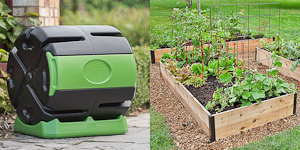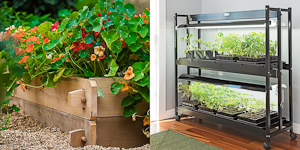- Home
- Raised Bed Vegetable Gardening
- Organic Vegetable Garden
The Organic Vegetable Garden
Growing an organic vegetable garden yourself is the absolute best way to bring the freshest, most delicious, most healthful vegetables possible into your kitchen and onto your plate. It's also something that can change your life - if you let it - in wonderful and unexpected ways. There’s something deeply gratifying about caring for the soil, nurturing plants, and eating vibrant food you’ve grown yourself that strengthens both the body and the soul. This article will introduce you to the basics of growing an organic vegetable garden and direct you to more detailed information that you'll need as you progress along your journey.
Everything on Vegetable Gardening with Lorraine is about organic gardening, but this article specifically addresses some common questions.
Benefits of an Organic Vegetable Garden
- provides the most nutritious vegetables possible (when properly mineralized)
- no pesticide residues
- no GMOs
- no chemical fertilizers to kill off soil organisms
- you get to participate in a natural cycle of life, in a way you must experience to believe
- you get exercise and sunshine!
To be considered organic by the USDA and other regulatory agencies, vegetables must be from non-GMO seeds, be grown without synthetic chemical pesticides or fertilizers, and not be irradiated or treated with chemicals after harvesting. For more benefits you may want to read The Top Ten Benefits of Organic Gardening.
Start with a Soil Test
When you are
starting an organic vegetable garden
for the first time (or transitioning a chemical garden), it is important
to perform a soil test, which will show if your garden soil is lacking
in any nutrients. The best way to do this is through Logan Labs, NOT your local state
extension service. They will provide you with
instructions on how to sample your soil, and it usually costs around
$20-25. Home test kits are generally not very accurate and do not test a wide enough array of necessary minerals.
If your garden is low in any specific nutrients, you can supplement your initial crop with appropriate organic fertilizer. There are detailed instructions on interpreting your soil test and creating a custom mix to correct your deficiencies (it is not as simple as it may sound) on my organic fertilizer page.
Compost
Compost is not optional or just a good idea, it is the essential foundation of an organic vegetable garden. All yard, garden, and vegetable kitchen waste should be composted for use on the garden, and there are a variety of compost bins, tumblers, worm bins and other methods available. Compost provides humus and microbes, and is also required for good soil structure. Soil structure is important for plant health and bug resistance.
I love the whole science of soil ecology - most of us don’t realize that the long-term sustainability of life on planet earth is dependent on the health and balance of tens of thousands of different organisms that live in the soil, each of which has a specific job to do. Only an organic vegetable garden works with and supports soil ecology in this way. Chemical fertilizers kill soil life the way salt kills a snail.
A great read in the wintertime, when you're dreaming of your summer garden but see only snow outside, is Teaming with Microbes by Lowenfels and Lewis. Bottom line: microbes keep soil healthy, which keeps plants healthy, which keeps us healthy.
Organic Vegetable Garden Layout
There
are many different methods for laying out an organic vegetable garden,
but only a few methods are truly sustainable in the long term. I have
written an article on vegetable garden layout with details of the common
methods, and advantages and disadvantages of each. You can also check out the raised bed vegetable garden article for a gallery of designs and plans.
For years my personal preference was the double-dug, French intensive
method of vegetable gardening. It had been shown to be the highest-yielding method per square foot
of any method,
while at the same time requiring the fewest inputs. HOWEVER, I have learned over the years that for optimal nutrition, giving plant's roots more space actually yields more, if you are optimizing your soil's soil's minerals and microbes.
If I could only own only one gardening book, it would be Gardening When It Counts by Steve Solomon. There are no colorful, inspiring photos, no glossy
paper, and no frills, just the most essential, complete vegetable
gardening information anyone starting out could want. This book will
teach you the basics as well as the subtleties of soil health, the right use of compost, root development, watering,
If you are a serious organic gardener wanting to learn what sustainability really means, this is the book. (And, thank heavens no one told me that I had to only own one book! ) There are many other great gardening books out there, like
- Grow Your Own Vegetables by Joy Larkcom.
- The Intelligent Gardener by Steve Solomon
- The Resilient Gardener by Carol Deppe
- Teaming with Microbes by Jeff Loewenfels
Dealing with Plant Pests Organically
The three most useful ways that I have found to deal with plant pests organically are:
- good ol' soap spray
- fish emulsion
- neem oil
These may not work on every bug you may encounter, but they work on most of them. Neem oil is a fascinating substance that works in a number of different ways on pests, mostly by interrupting their reproductive cycle.
Soap Spray
- 1 bulb garlic
- 1 onion
- 1 Tablespoon cayenne powder
- 1 Tablespoon liquid dish soap
- 1 quart water
Soap spray works pretty well on soft-bodied insects like aphids.
Fish Emulsion
Buy Alaska Fish Fertilizer from Home Depot, mix a Tablespoon in a spray bottle of water, and spray on plants. I don't know why, but it works great against flea beetles, which seem to be very partial to my beloved collard greens. (I think the fish emulsion just smells so bad that the flea beetles get nauseated and lose their appetite!).
More Advanced Techniques for Organic Vegetable Gardening
After your first year, you will want to begin incorporating some more advanced techniques to maximize the ongoing health of your garden. You will want to start planning ahead a little more.
Each year when you work on your vegetable garden layout, you should have the previous year's layout in front of you so that you can pay close attention to crop rotation, companion planting, organic weed control and providing habitat for beneficial insects. Paying attention to all of these together is part of what makes an organic vegetable garden work in harmony with nature instead of against it. It's a bit of an art form (as well as a science) to juggle all these bits of knowledge into a synergistic whole, and it is both challenging and rewarding.
And fall gardening is another whole adventure. It is possible to extend your yield of many leafy greens, root crops and cabbage family crops right up to and even past your first frost date in the fall, if you plan ahead (...way ahead). Check out the fall gardening article.
A Final Thought (or Two)
Organic vegetable gardening can become an integral part of one's life, binding a person to the natural world of which they are a part, but from which most peoplefeel apart. I love my computer, but I am not a machine, and need regular immersion in the natural world to recharge the natural cycles of my physical self.
Some folks run on the beach, some hike on the trails, some sit on a park bench and feed the pigeons. I like to work in a symbiotic relationship with nature in my garden, to bring that essence into my life, my kitchen and my body. I hope you will find vegetable gardening as rewarding as I do. (But I also love running on the beach, hiking on the trails, and feeding the pigeons in the park... ) ;-)
Help share the skills and spread the joy
of organic, nutrient-dense vegetable gardening, and please...
~ Like us on Facebook ~
Thank you... and have fun in your garden!
Affiliate Disclaimer
This website contains affiliate links to a few quality products I can genuinely recommend. I am here to serve you, not to sell you, and I do not write reviews for income or recommend anything I would not use myself. If you make a purchase using an affiliate link here, I may earn a commission but this will not affect your price. My participation in these programs allows me to earn money that helps support this site. If you have comments, questions or concerns about the affiliate or advertising programs, please Contact Me.Contact Us Page



